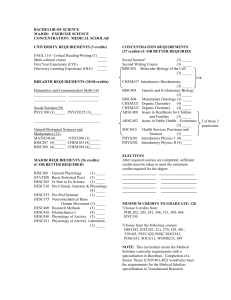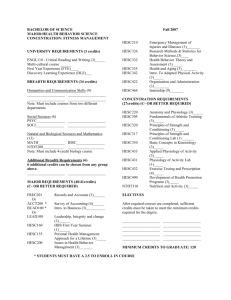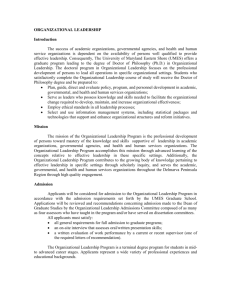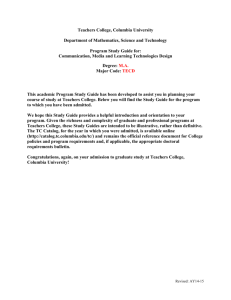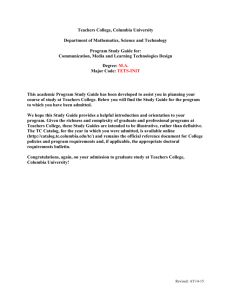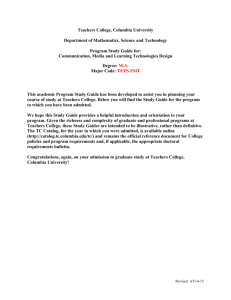Graduate Study Programs in Social
advertisement
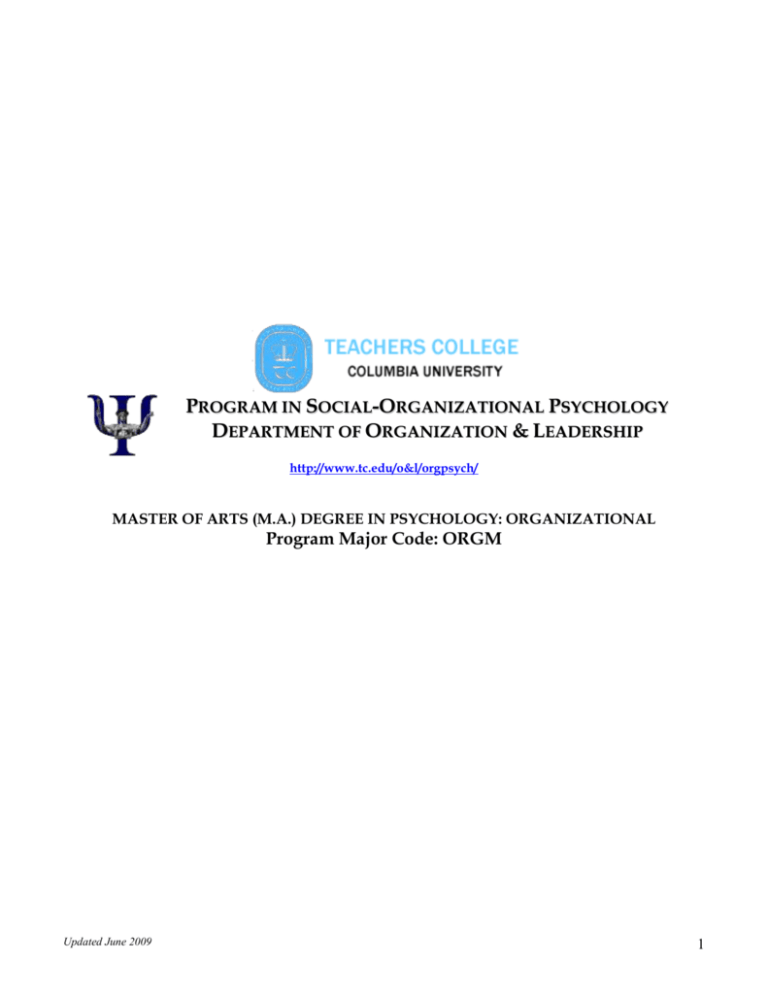
PROGRAM IN SOCIAL-ORGANIZATIONAL PSYCHOLOGY DEPARTMENT OF ORGANIZATION & LEADERSHIP http://www.tc.edu/o&l/orgpsych/ MASTER OF ARTS (M.A.) DEGREE IN PSYCHOLOGY: ORGANIZATIONAL Program Major Code: ORGM Updated June 2009 1 SCHEDULE OF CLASSES Teachers College courses - http://www.tc.columbia.edu/tc%2Dschedule/schdsearch.cgi Columbia University courses - http://www.columbia.edu/cu/bulletin/uwb/ PROGRAM OF STUDY OVERVIEW The program curriculum is comprised of: (a) major courses consisting of four required core courses; (b) five required advanced core courses; (c) other General Elective (usually ORLJ) courses; and, (d) three non-ORLJ Breadth Elective courses taken for at least 2 points each in related fields. These Breadth Electives must be taken within Teachers College (see Teachers College Catalog, “General Requirements for the M.A. Degree”). ADDITIONAL INFORMATION REGARDING BREADTH AND ELECTIVE COURSES All Breadth (non-ORLJ) courses MUST be taken for AT LEAST two credits. One credit non-ORLJ courses are not accepted toward satisfying your Breadth requirement. The only exceptions are one credit courses taught by Stephen Brookfield and these courses MUST be taken IN THE SAME SEMESTER. To satisfy General Elective requirements courses may be taken at Teachers College in the Social-Organizational Psychology program or in other related programs at the College, or at the Graduate School of Business, Engineering and Applied Sciences, Social Work, and in other areas of the Columbia University Graduate programs. Courses taken at Columbia University, but not at Teachers College count toward the General Elective requirement within social-organizational psychology, NOT toward the Breadth requirement. Again, breadth courses must be taken within Teachers College. Students should consult with an advisor to select breadth and elective courses. An effort is made to assist students in developing a program of study that will best meet their personal career interests and objectives. Summary: Course Requirements Social-Organizational Psychology M.A. Program COURSES POINTS Core Level 1 4 courses @ 3 points each Core Level 2 5 courses @ 3 points each Breadth Requirement 3 courses @ at least 2 points each Non-ORLJ must be taken at Teachers College Elective/Concentration Courses ORLJ -or Non-ORLJ (course(s) must be at least 2 credits) TOTAL 12 15 6-9 9-12 45 Within the program, students may want to concentrate in any one of three areas: • human resource development • organizational change and consultation • conflict resolution. However, students are not required to choose a concentration and most students pursue a generalized course of study. A student who wants a broadly based and general degree in social-organizational psychology will select courses across all three areas of concentration (with the help of an academic advisor). Updated June 2009 2 M.A. PROGRAM COURSEWORK GUIDE OPTIONAL AREAS OF CONCENTRATION Human Resource Management Organizational Change & Consultation Conflict Resolution SUGGESTED COURSES FOR AREAS OF CONCENTRATION Human Resource Management Recommended courses for this area of concentration: • ORLJ 5002 Advanced Functions of Organizations (3) • ORLJ 5019 Data-based Consulting (3) • ORLJ 5110 Individual Assessment and Development in Organizations (3) • ORLJ 6343 Practicum in Change and Consultation in Organizations (4) • ORLD 5055 Staff Development and Training (3) • ORLD 5062 Human Resource Development in Organizations (3) • CCPJ 5062 Career Counseling and Development (2–3) Organizational Change and Consultation Recommended courses for this area of concentration: • ORLJ 5019 Data-based Consulting (3) • ORLJ 5020 Special Topic: Executive Coaching (3)* • ORLJ 5045 Organizational Dynamics and Theory (3) • ORLJ 5310 Preparation for Coaching (3) • ORLJ 6343 Practicum in Change and Consultation in Organizations (4) • ORLJ 5005 Leadership and Supervision (3) *This course number is subject to change, but the title will remain the same. Updates will be provided by the Program. Conflict Resolution (Note: Students interested in receiving a Certificate of Attendance in Conflict Resolution must complete a sequence of 5 courses and 1 semester of internship. Please contact ICCCR for further information: 212-678-3402) Recommended courses for this area of concentration: • ORLJ 5340 Basic Practicum in Conflict Resolution and Mediation Skills (3) • ORLJ 6040 Fundamentals of Cooperation, Conflict Resolution and Mediation in Different Institutional Contexts (3) • ORLJ 6350 Advanced Practicum in Conflict Resolution and Mediation, Section I (3) • ORLJ 6350 Advanced Practicum in Conflict Resolution and Mediation, Section II: Designing Conflict Management Systems (3) Updated June 2009 3 Other Suggested Social-Organizational Psychology Elective/Concentration Courses: The following courses are suggested electives within ORLJ. Students may choose from among these electives and other relevant electives that are not listed here. • ORLJ 4901-012 Research Team (3) • ORLJ 4010 Executive Coaching (3) • ORLJ 5002 Advanced Functions of Organizations (3) • ORLJ 5005 Leadership and Supervision (3) • ORLJ 5012 Organizational Internship (1-3) • ORLJ 5016 Special Topics in Social-Organizational Psychology: - Psychology of Motivation (3) • ORLJ 5018 Using Survey Research in Organizational Consulting (3) • ORLJ 5019 Data-based Consulting (3) • ORLJ 5020 Special Topics in Social-Organizational Psychology - Practices in Human Resource Management (3) • ORLJ 5110 Individual Assessment & Development in Organizations (3) • ORLJ 5046 Intercultural Communication: Theories, Issues & Practice (3) • ORLJ 5047 Development of the Multi-cultural Self (3) • ORLJ 5311 Management and Leadership Practices (3) • ORLJ 6343 Practicum in change and consultation in organizations (4) • ORLJ 6350 Adv. practicum in conflict resolution and mediation, section I (3) • ORLJ 6350 Adv. practicum in conflict resolution and mediation, section II: designing conflict management systems (3) Suggested Outside Social-Organizational Psychology Courses: Please consult with an academic advisor. (Please note that not all classes are offered each semester. This list is not exhaustive and is subject to change.) • ORL 6500 Qualitative research methods: design and data collection • ORL 6501 Qualitative research methods: data analysis & reporting • CCPJ 4064 Principles and methods of psychological counseling (3) • CCPJ 5020 Racism and racial identity in psychology and education (3) • CCPJ 5062 Career counseling and development (3) • CCPJ 5361 Preparation for individual counseling and interviewing (3) • CCPX 4030 Psychology of adjustment (3) • CCPX 5034 Developmental psychopathology (3) • HBSS 4120 Topics health education: stress (2–3) • HBSS 4120 Topics health education: health and business (2–3) • HBSS 4140 Developing workplace health promotion programs (3) • HUD 5021 Methods of empirical research (3) • HUDF 5020 Methods of social research: survey methods (3) • HUDK 5034 Research methods for cognition and learning (3) • HUDK 5198 Psychology of instructional systems designs (3) • HUDM 4050 Introduction to measurement (2-3) • HUDM 4122 Probability and statistical inferences (3) • HUDM 5055 Evaluations of institutions: programs and curricula (3) • HUDM 5056 Evaluations of institutions: programs and curricula, II (3) • HUDM 5058 Choice and decision making (3) • HUDM 5059 Psychological measurement (3) • HUDM 5122 Applied Regression Analysis (3) • MSTU 4010 The nature of communication (2–3) • MSTU 4031 Programming I (4) • MSTU 4052 Computers, problem solving and cooperative learning (Parts I & II) (3) • MSTU 4083 Instructional design of educational technology (3) • MSTU 4085 New technologies for learning (2–3) • MSTU 5510 Topic Seminar: technology, education, and social policy (3) Updated June 2009 4 • ORLA 4011 Behavior in organizations (3) • ORLA 4046 School finance: policy/practice (3) • ORLA 5017 Groups and interpersonal behaviors (2–6) • ORLA 5018 Understanding authority and exercising leadership (3) • ORLA 5530 Action research in organizational behavior (3) • ORLD 4051 How adults learn (3) • ORLD 4052 Program development: assessing learning needs and evaluating outcomes (3) • ORLD 4053 Facilitating adult learning (3) • ORLD 4827 Fostering Transformative Learning (2-3) • ORLD 5054 Strategy Development and Learning Processes in Organizations (3) • ORLD 5055 Staff development and training (Parts I & II) (3) • ORLD 5056 Adult education: social action (3) • ORLD 5057 Adult learning and education: theory and practice (3) • ORLD 5061 Advanced staff development and training (3) • ORLD 5062 Human Resource Development (3) • ORLD 5520 Research in Organizational Learning (3) INTERNSHIP Further, while not a prerequisite for graduation, an internship may be helpful for proper job placement. The purpose of the internship is to provide students with an opportunity to gain practical experience relevant to their interests, and to apply the principles of social-organizational psychology theories to real-world situations. Internships may be paid or unpaid. There are a number of ways to find an internship, including contacting Career Services in 44 Horace Mann (678-3140), or taking the initiative to find your own internship through contacts with employers, other students, professional associations (e.g., Society for Human Resource Management, ODNetwork of New York, ASTD, Metro), or the Internet. Once you have found an internship, and if you wish to receive academic credit, please contact the socialorganizational psychology program office to seek approval to register for the internship course (ORLJ 5012), as well as criteria and expectations for receiving credit. You may elect either to take the course for 1 to 3 credits, for a total of 4 credits. Students may register for internship class for more than one semester, but the total number of points may not exceed 4 credits [Ex: One may register for internship for four semesters for 1 credit each semester for a total of 4 credits, or register for two semesters (for 2 and 2 credits or 1 and 3 credits, etc.) – as long as the total number of points credited toward the course over the duration of one’s study never exceeds 4 credits]. If you obtain an internship mid-semester or later, you may register for the course the following term. If students intend to take the internship course as your “plus one” Core Level 2 course, then you must take it for at least 3 credits, total. PROGRAM ADVISEMENT A student is expected to consult regularly with an advisor during their course of study. The MA Program has two faculty members designated to provide advisement to masters students: the MA Program Coordinator and MA Program Advisor, and students should feel free to contact these faculty with any questions regarding their course of study. In addition, students are free to request advising from any program faculty member at any time throughout their course of study. Please also note that it is the responsibility of the student to document all of their course work and other special approvals in a file in the Program Office at 222 Zankel Building. It is also advisable for each student to keep personal copies of their documentation. Updated June 2009 5 GRADES AND PASS/FAIL POLICY According to Teachers College policy, a student who accumulates eight points or more in C- or lower grades will not be permitted to continue study at the College and will not be awarded a degree or diploma (See also 2009-2010 Teachers College Catalog, pg. 267). The academic policy for the Social-Organizational Psychology program is more rigorous than that of the College . Core courses may not be taken as Pass/Fail and students must achieve a C+ or better in these courses to satisfy the M.A. degree. In the event where a student is awarded a grade of C or lower in a core course, the student must retake the course and achieve a B- or better. If a student achieves a C- or lower in any course, the student must consult with an academic advisor in the social-organizational psychology program immediately to discuss academic progress and is subject to review. All courses, including Elective/Concentration courses and those fulfilling the Breadth Requirement, should be taken for a grade, unless the course is only offered with a Pass/Fail grading option. Students may not take more than 2 Pass/Fail courses toward fulfilling their degree. EXEMPTION GUIDELINES In some cases, students may petition to waive out of a course. In order to waive out of a course, it is the student’s responsibility to demonstrate that their previous graduate course work is redundant with material covered in the petitioned course. Students will be asked to provide a variety of materials to establish that a redundancy exists. Examples of relevant material include but are not limited to a combination of the following: A graduate transcript indicating that relevant course work was taken and that the student received a grade of B or higher in these courses; a syllabus or syllabi (not a course description) indicating the topics covered in their previously taken course(s); relevant thesis work; serving as a teaching assistant for related courses; serving as a research assistant for a professor working on topics related to the petitioned course. Students interested in petitioning to waive out of a class should speak to the instructor of the course as well as their faculty advisor. Exemption from any course remains at the discretion of the faculty advisor. COMPREHENSIVE EXAMINATION The Comprehensive Examination may be taken after a student has completed the core courses (level 1) with a grade of C+ or better in each course and has completed at least 32 credits (or is in the process of completing at least 32 credits when the exam is being given). It is preferable that the exam is taken one semester prior to graduation. The exam covers all of the major topic areas in social-organizational psychology. Exams will be given three times a year; once in the Fall, Spring and Summer. Exam dates will be announced via email during the Fall semester. Students must pass with an 80% or above. Students may not take the exam more than twice. If a student fails the Comprehensive Examination twice, s/he may not be allowed to graduate from the program. SERVICES FOR STUDENTS WITH DISABILITIES The College will make reasonable accommodations for persons with documented disabilities. Students are encouraged to contact the Office of Access and Services for Individuals with Disabilities for information about registration (166 Thorndike Hall). Services are available only to students who are registered and submit appropriate documentation. Updated June 2009 6 STATEMENT ON ACADEMIC CONDUCT A Teachers College student is expected to refrain from any conduct, including cheating, plagiarizing, or purchasing documents submitted for academic evaluation, that calls into question his/her academic and/or professional probity. Decisions regarding academic evaluation in all aspects of students’ work at the college, including course work, certification examinations, clinical or field experiences, and preparation of dissertations, are within the sole jurisdiction of the faculty concerned, including as appropriate, the department or program staff members. Disciplinary actions (e.g., reprimand, suspension, or dismissal) in cases of academic misconduct can be imposed by the Vice Provost or the Committee on Student Conduct. RESOLUTION OF STUDENT ACADEMIC PROGRAM CONCERNS Any student who has a concern regarding an academic matter may seek assistance. The procedure for resolving academic program concerns (see note of grade correction process below) begins with either the faculty member (if the concern is related to a course) or the student’s advisor. If the student is not satisfied with the response or resolution achieved at this first level, or if speaking with the faculty member presents a conflict of interest for the student, the student should proceed to speak with the Program Coordinator in the area in which the academic concern resides. If the student is not satisfied with the response or resolution achieved through the Program Coordinator, the student should proceed to speak with the Chair of the academic department in which the academic concern resides. If the student is still not satisfied with the response or resolution achieved through the Department Chair, or if speaking with the Department Chair presents a conflict of interest for the student, the next step is to contact the Office of the Vice Provost. At any stage of the process, students are welcome to seek the advice and guidance of the Ombudsman, who is charged with attempting to informally resolve student dissatisfaction of an academic nature on a completely confidential basis. GRADE CORRECTION PROCEDURE The instructor for a course has the responsibility for setting the requirements for a course and making an evaluation of students’ work. Once a grade has been given, the instructor is not free to change the grade unless the instructor indicates to the Registrar that an error was made in the original grade transmitted. If a student believes that an error has been made, he/she must take the initiative in bringing about the necessary correction prior to the conclusion of the semester immediately following the semester in which the course was taken. The normal procedure for effecting a correction would be through direct discussion between the student and the instructor. If redress cannot be attained through such discussions, the student may next appeal to the department chairperson of the department offering the course. If resolution cannot be attained through appeal, the student may next appeal to the Dean. In situations where the student feels that such an appeal process might not be in the student’s interest, counsel and assistance can be sought from the Office of the College Ombudsman and the Office of the Vice Provost. Social Organizational Psychology Office (M.A. Program) 222 Zankel Building (212) 678-8109 (212) 678-8152 (212) 678-8253/8303 [fax] Teachers College General Line (212) 678-3000 Columbia University General Line (212) 854-1754 Revised: June 2009 Updated June 2009 7 Updated June 2009 8

